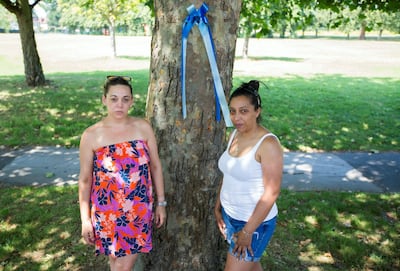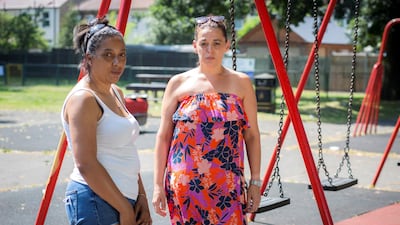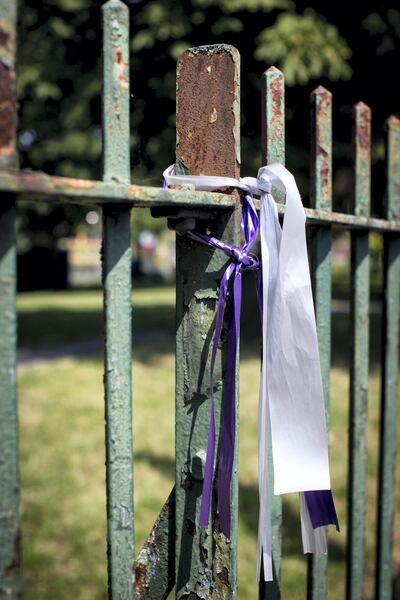While most school staff look forward to having an extended break from work, London teacher Yemi Hughes has reason to dread summer holidays.
Yemi, who is head of year at a secondary school in Croydon, south London, lost her son Andre Aderemi in the summer of 2016.
Andre, 19, was stabbed 20 times in the area he had grown up in, one of 111 people to be murdered in the capital that year.
In the past eight years, knife crime in England and Wales has soared, with the year ending in March 2018 the deadliest on record. While London itself has witnessed a rise of 71 per cent in violent incidents between 2012-13 and 2017-18.
A spate of highly publicised stabbings even got the attention of the US President Donald Trump, who retweeted a post by far-right commentator Katie Hopkins last month highlighting five violent attacks in the capital within 24 hours, which left three men dead.
While Mr Trump used the attacks to criticise London mayor Sadiq Khan, the knife crime epidemic in the capital has left residents worried about safety on street and picking up the pieces for shattered families.
Nichole Young, 39, was born and bred in the same London dormitory town. She grew up on a social housing estate where she said “everybody knew each other” and shared a sense of community.
But Nichole, a grandmother, has seen the atmosphere change dramatically in recent years. Not a day goes by when she doesn’t hear sirens as armed police vehicles come charging down the street where she lives.
She became an anti-knife campaigner last year after her best friend’s 20-year-old son was fatally stabbed multiple times on a residential street close to a children’s nursery. Kelva Smith was murdered by a former friend in 2018 in an argument over a motorbike.
Nichole began tying handmade ribbons around Croydon in memory of Kelva and to show solidarity with other bereaved families in the community. She also began a Facebook group to raise awareness of knife crime in the area and to organise meetings and protests.

Nichole later met Yemi, 40, after Yemi’s son introduced the pair on Facebook. The women have since joined forces to try and prevent more mothers across London from losing their children.
“We lost a boy in Hackney recently. That hit me really hard, I couldn’t stop crying,” Yemi said.
The mothers travelled across the capital to the site of the murder to lay flowers and tie ribbons in solidarity, offering support to the family that Yemi lacked when her son was killed.
“When I lost Andre, I’d be lying in bed at 3 o’clock in the morning and there would be questions I wanted to ask but I had no one I could speak to. Now, I give my number out to bereaved mothers so they can ring me any time and ask questions,” she said.
The women are members of Operation Shutdown, a peaceful protest movement, which calls on Britain’s parliament to convene national crisis meetings to listen to a list 15 demands they have compiled. As well as showing solidarity with other families, Nichole and Yemi have used their own personal experiences with knife crime to campaign for change in the capital. Earlier this month, they were invited to meet London mayor, who listened to their concerns about the spike in violence.
Labour politician Mr Khan has claimed there is a “direct link” between austerity measures imposed by successive Conservative-led governments and a rise in serious youth violence.
Meanwhile ministers in the governing Conservative Party have blamed a rise in middle-class drug use for fuelling the gang violence.
For Nichole and Yemi, the issue is a lot more complex. Andre’s killers were a group of friends and were not in a gang.
“We know boys who have killed. Some of them have come from broken homes,” Nichole said.
“There’s a lot of factors. You have kids who have come from violent upbringings. Some will have parents who have drug issues.”
In Andre’s case, police failed to act on several incidents of violence that led to his death. One of Andre’s killers was the boyfriend of a childhood friend. Andre had witnessed Fabio Cela beating up his friend and intervened to stop him, beginning a row that would lead to his murder.
Before Andre’s murder one of his friends was shot in the face in a drive-by shooting. The family's home was also attacked with the windows smashed.
Yemi had told the police about her concerns about her son’s soon-to-be killers but this fell on deaf ears. She moved Andre and her other two sons to another town 40 miles away because she was worried about their safety. Andre was chased down and murdered by Cela and two accomplices, Rodney Mukasa, 20, and Ali Zahawy, 19, with knives and a metal pole on a visit home.
“When I went to court that’s when I realised that Andre’s killers carried knives. One of them had been filmed waiving a knife, threatening to kill my son before he did it. One had been stopped by police with two samurai swords on different occasions and a shotgun. And another was stopped in a car with four knives and a pole in it,” Yemi said.
During the trial, Yemi said her son’s killers showed no remorse, even laughing and joking with their parents that they would be home soon. It was only when they were found guilty and faced the prospect of lengthy prison sentences that they began to get upset.
“They didn’t react when they were shown a body map of my son’s 20 stabs. The jury were crying when they saw it and one woman was physically wanting to throw up,” she said.
While Andre’s killers are in prison, the stabbings are continuing. Figures by London’s Metropolitan police show that violent crime spikes in the warmer months, when people are more likely to be outside.
“I hate the summer holidays,” Yemi said.
Nichole said: “When you speak to any parents, they dread it. Inevitably they’re working and so their children aren’t answerable to anyone.”
“I used to go to youth club every day but there’s nothing like that anymore,” Yemi added.
The mothers believe the answer to the issue lies in investing in the youth, from providing better mental health services to reopening closed youth clubs.
But for the current cohort of teenagers already involved in violent crime, the women believe it might already be too late.
“I don’t think there’s much we can do with the current generation. We need to look at the next generation that is coming up to secondary school,” Yemi said.
“Community is key to all of this. There is no instant answer. What are you going to do? Put the army on the street and set up checkpoints? That’s never going to happen,” Nichole said.
“We know this is going to be 10 years in the making for anything to get better. It might be that we have to accept that we will have 10 more years of kids dying.”






